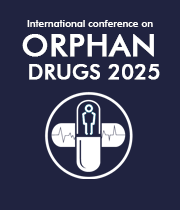Orphan Drugs 2025 _ Event Postponement
This is to inform that due to some circumstances beyond the organizer control, “2nd International Conference on Orphan Drugs and Rare Diseases” (ORPHAN DRUGS 2025) scheduled during March 13-15, 2025 in Rome, Italy has been postponed. The updated dates and venue will be displayed shortly.
Your registration can be transferred to the next edition, if you have already confirmed your participation at the event.
For further details, please contact us at orphan-drugs@magnusconference.com or call + 1 (702) 988 2320.
Post-Marketing Safety and Treatment Outcomes
To examine the safety and efficacy of new pharmaceuticals, a multi-stage process involving drug discovery, animal studies, and human clinical trials is used. Rare disease medication development entails a lower number of patients, a higher proportion of children, and a more convoluted clinical presentation. Post-approval studies are intended to address a lot of faults that have been identified in rare disease clinical trials. Observational studies, pragmatic trials, and randomized controlled studies are all examples of post-approval research for rare disorders. Original data collecting studies and the utilization of secondary data are both examples of observational studies (retrospective studies). Original data collection can help retrospective investigations overcome restrictions caused by inadequate information in secondary data sources. Disease registries focus on specific health care outcomes associated with a single product and may include a comparator of an alternative therapy or therapies, whereas product-related registries focus on specific health care outcomes associated with a single product and may include a comparator of an alternative therapy or therapies.
- Drug Discovery
- Animal Studies
- Human Clinical Trials
- Observational Studies
- Pragmatic Trials
- Randomized Controlled Studies
- Post-Marketing Surveillance
- Regulatory Requirements
- Pharmacovigilance
- Pharmacoepidemiology
- Risk Evaluation
- Mitigation Strategies

Sergey Suchkov
The Russian University of Medicine & Russian Academy of Natural Sciences, Russian Federation
Vladlen Slepak
University of Miami, United States
Harsha Rajasimha
Jeeva Clinical Trials, Inc, United States
Vladlen Slepak
University of Miami, United States
Harsha Rajasimha
Jeeva Clinical Trials, Inc, United States
Sergey Suchkov
The Russian University of Medicine & Russian Academy of Natural Sciences, Russian Federation


Title : Emerging solutions for inclusive orphan drug clinical trials management
Harsha Rajasimha, Jeeva Clinical Trials, Inc, United States
Title : Ectopically expressed olfactory receptors as an untapped family of drug targets. Discovery of agonists and antagonists of OR51E1, an understudied G protein-coupled receptor
Vladlen Slepak, University of Miami, United States
Title : Personalized and Precision Medicine (PPM) as a unique healthcare model to secure the human healthcare and biosafety among childhood
Sergey Suchkov, The Russian University of Medicine & Russian Academy of Natural Sciences, Russian Federation
Title : Orphan and rare disease emerging as a global public health priority through the view of personalized and precision medicine: How to use the latter to revolutionize pediatric services
Sergey Suchkov, The Russian University of Medicine & Russian Academy of Natural Sciences, Russian Federation
Title : Personalized and Precision Medicine (PPM) though the view of reproductive healthcare, pediatric services and natural family planning: an option for clinicians and caregivers realize the potential of genomics-informed care to secure the individualized human biosafety
Sergey Suchkov, The Russian University of Medicine & Russian Academy of Natural Sciences, Russian Federation
Title : Democratizing ASO drug discovery at La Jolla Labs
Melissa Keenan, La Jolla Labs, United States